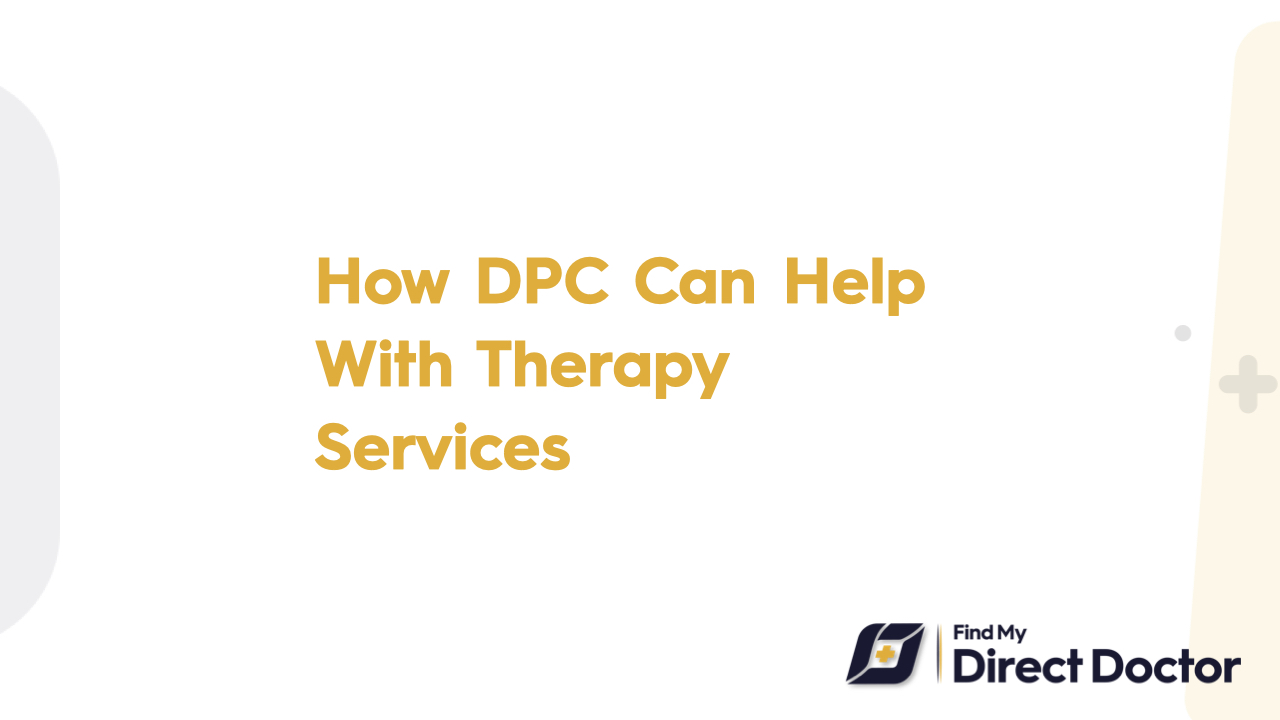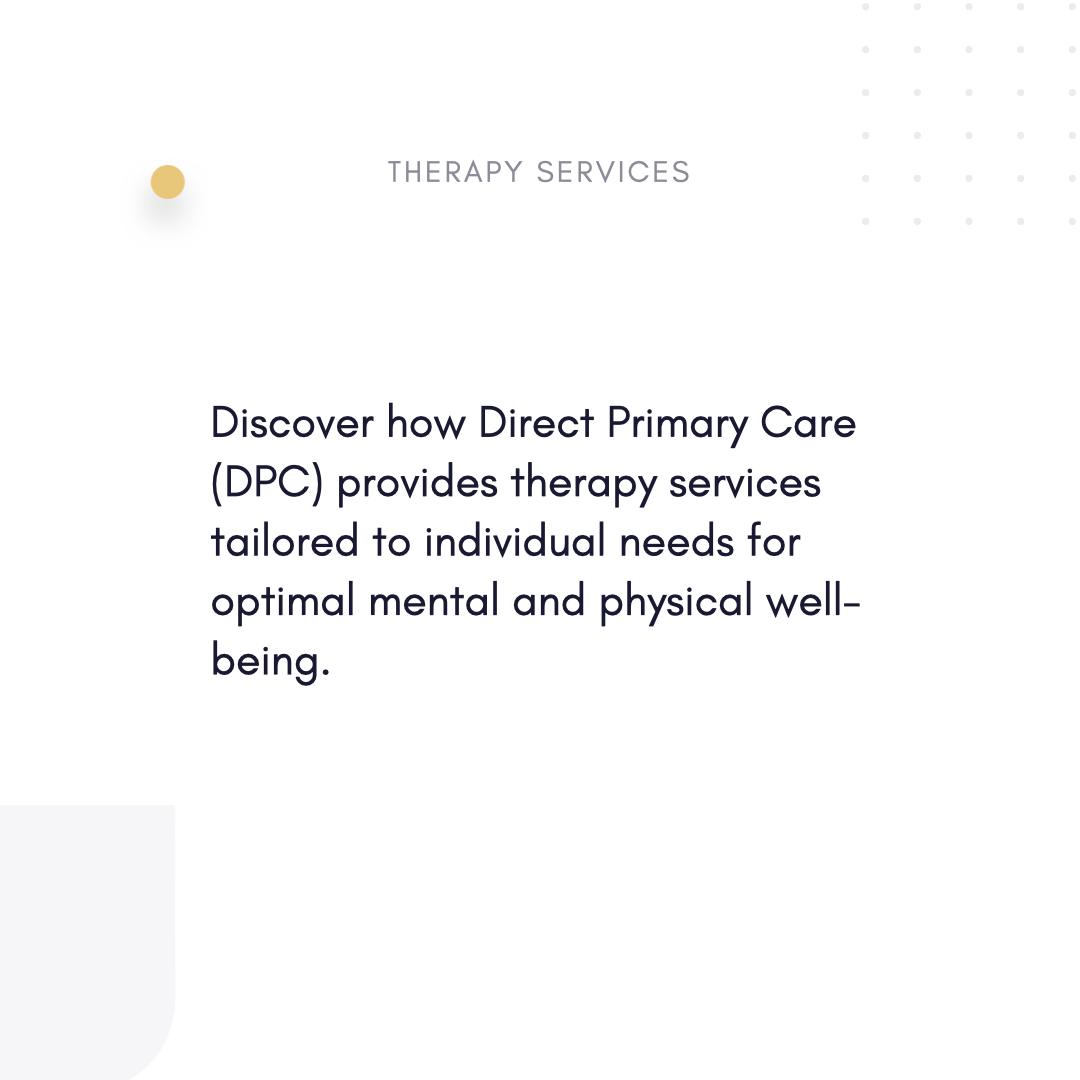Therapy Services and Direct Primary Care (DPC): Healing, Support, Personalized Care
Therapy services can help you get back to normal if you can't move around because of an injury, surgery, or long-term pain. DPC makes sure that your rehab is planned, fits your budget, and meets your needs.

Things you should know about therapy services: Getting Freedom and Movement Back
People who have had surgery, strokes, or sports injuries can get better with physical, occupational, and speech therapy.
- Take care of chronic illnesses like multiple sclerosis, arthritis, and Parkinson's.
- Stop the decline: training for balance and fall prevention.
Key points:
- Safety: Methods that don't hurt and are based on facts.
- Costs: DPC memberships (80–250 USD/month) include sessions, but traditional fees (80–150 USD/session) do not.
Risks of not treating problems include:
- Permanent disability and a lower quality of life.
How DPC Makes Therapy Work Better
Direct Primary Care (DPC) changes rehab by putting the patient first and making sure that everything works together.
Complete Assessment and Planning
- Evaluations on the same day: Schedule PT/OT evaluations within 48 hours.
- Plans that include more than one field: Use more than one therapy to help you get better after a stroke.
- Telehealth can help people make sure their homes are safe by suggesting things like grab bars or ramps.
Prices that are easy to understand and help all around
- Care that covers everything: The membership includes physical therapy, occupational therapy, speech therapy, and equipment.
- Saving money: You can save 30% to 50% on copays with self-pay DPC rates.
- Putting mental health together: Handle the anxiety and depression that come with long-term pain.
Access to Personalized Recovery and Long-Term Health
- Every day of the week, 24 hours a day: When you have flare-ups, use the app to change how hard your workouts are.
- Wearable devices can help you keep track of how many steps you take or how far you can move.
- Focus on prevention: Make plans for working out at home to keep up your progress.
Benefits of DPC for Patients in Therapy
- No time to wait: 90% of DPC patients start therapy within a week, but it usually takes 3 weeks or more.
- Continuity: One group is in charge of medications, lab work, and rehabilitation goals.
- There are no extra costs: Prices that are easy to understand, like 1,000 USD for 12 PT sessions.
Real-Life Success Stories
- Case 1: Maria, 65, had her hip replaced. Her DPC team sent a physical therapist to her home to help her get her mobility back in eight weeks.
- Case 2: Alex, 30, is getting better after being hit by a car. Alex's DPC provider used both physical therapy and chiropractic care to help him get rid of his whiplash in six weeks.
Questions and Answers: DPC Provides Therapy Services.
- Q: How many times do I need to go?
- A: 6 to 24, depending on the situation; DPC changes every two weeks.
- Q: Is it possible for me to have virtual sessions?
- A: Yes. DPC does offer telehealth PT for exercises at home.
- Q: Can I use my health insurance?
- A: The self-pay model at DPC is often less expensive than copays.
- Q: What happens if things don't keep going?
- A: DPC quickly looks over the plan again and makes changes.
Why DPC is Great for Rehab Care
The American Physical Therapy Association (APTA) places a strong emphasis on individualized care. DPC gets things done by:
- Shortening the time it takes to recover: Custom plans cut rehab time by 20–30%.
- More people sticking with their treatment: 90% of DPC patients finish their treatment, compared to 60% of US patients do.
- Cutting costs: Members save between 1,500 USD and 6,000 USD a year by getting all their care in one package.
Final Thoughts
At DPC, therapy isn't just about doing exercises; it's about getting your independence back with a team that cares about how you're doing. With DPC, you don't have to deal with insurance, you can talk to the best therapists, and you can get a rehab plan that changes as you do. Get care that helps you move forward, from evaluation to empowerment.






